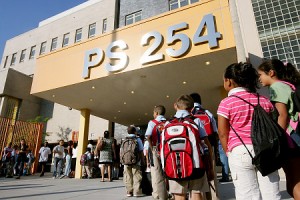 Audiences for live performance of opera are aging and declining. What ought to be done about that? General Manager of New York’s Metropolitan Opera, Peter Gelb, in an interview with the BBC (on which I posted, on a different topic, yesterday) has this to say:
Audiences for live performance of opera are aging and declining. What ought to be done about that? General Manager of New York’s Metropolitan Opera, Peter Gelb, in an interview with the BBC (on which I posted, on a different topic, yesterday) has this to say:
“The box office has not increased, it’s been flat which represents a shrinking playing field for opera – it’s not a secret in the US that the frequency of opera going is going down. …
“We are getting a newer audience, a younger audience, but there aren’t enough new audience members to replace the old audience members who are dying off.” …
Gelb lamented the lack of opera and arts education in schools in the US and elsewhere.
“Children are brought up to be tech wizards and to have the attention spans of mice. How do you educate new audiences to like opera which takes three or four hours and is in foreign languages?
“We’re trying. As long as governments are not interested in arts education, I think we are in a Catch-22 situation. [sic]
“How can we possibly hope to create new audiences for this art form if we are not introducing them or educating them?”
Let me speak to this not only as someone who studies the economics of the arts, but also as someone with children in public schools.
There is art in schools, not all of them, I know. My children are lucky enough to attend an elementary school with a terrific music teacher – they learn to sing, play recorder, put on a show. But the teachers at this school have a lot to do. They have to take kids of widely varying backgrounds and educational experiences, and get them into the habit of learning, questioning, studying, writing across the humanities, natural science and social science. They don’t want their students to have the “attention spans of mice,” so they engage in big projects that demand focus and perseverance.
Students are not going to learn about opera in school, at least not in any way beyond the completely superficial. And I don’t know how anyone who knows anything about life in a public elementary school could reasonably expect otherwise. I’m glad there is art education in school, and wish every school had its art and music teachers. But arts managers need to appreciate the limits of what could be done in schools to build future arts participants, even in the best of all possible worlds. Arts organizations will have to do some of the heavy lifting themselves.
So I would suggest that the General Director of one of the world’s most prestigious opera companies, located in a metropolitan area with a population of over twenty million, and who has an annual budget of more than $300 million to work with, ought not to blame the public education system for not doing enough to generate audience for his productions. It is unfair, and suggests an organization out of touch with its environment, a situation I thought elite arts organizations were at pains to overcome.

Thank you, Michael, for saying this so plainly. It really is time for the arts to stop expecting the educational system to engineer audiences for them.
Sadly, though, I think the Met situation is more about Peter Gelb positioning himself for combat with his unions. The audience crisis is no longer a problem to solve, it’s useful leverage for winning a battle in a war that’s already lost.
This claptrap from Gelb is absolutely incredible. Here is the guy has has eviscerated the Met’s legendary education program run by the Metropolitan Opera Guild. He ran off the Guild’s long-term director, David Dik, to another job and has basically made it into a non-entity in terms of education K-12 audiences about opera.
Not to mention that for the largest performing arts organization in the US by budget, it’s overall efforts in K-12 and community arts education are laughable. There are organizations with budgets a fraction of the Met’s, who do twice to three times what the Met does in arts education.
Look at any major performing arts organization in America and you will see major initiatives in K-12 education. Not the Met Opera. It’s about time they be taken to task for this.
Some of us have been doing Opera-In-Education since we were young ourselves! But it can only ever scratch the surface in terms of numbers. Say you can run a workshop ten times (ie that’s the funding you have), and the MAX would be 100 attendees (any more, and it’s not a “workshop” any longer), then you’ve shown the work to 1000 people. Which is chicken feed.
Schools matinees reach a far greater number of people, but ideally they need to be run in conjunction with workshops… you do some preparatory work with your schoolteachers, then you see a workshop, then you do some follow-up work, and ideally you go to see “the real thing’ at the theatre.
But where are the Koch Brothers when it comes to school matinee sponsorships? Covent Garden have this all much more carefully set up. So do Glyndebourne, and other British houses (like Opera North).
Tragically, however, I think the Met circumstance is all the more about Peter Geld situating himself for battle with his unions. The gathering of people emergency is no more an issue to illuminate, its helpful influence for winning a fight in a war that is as of now lost.